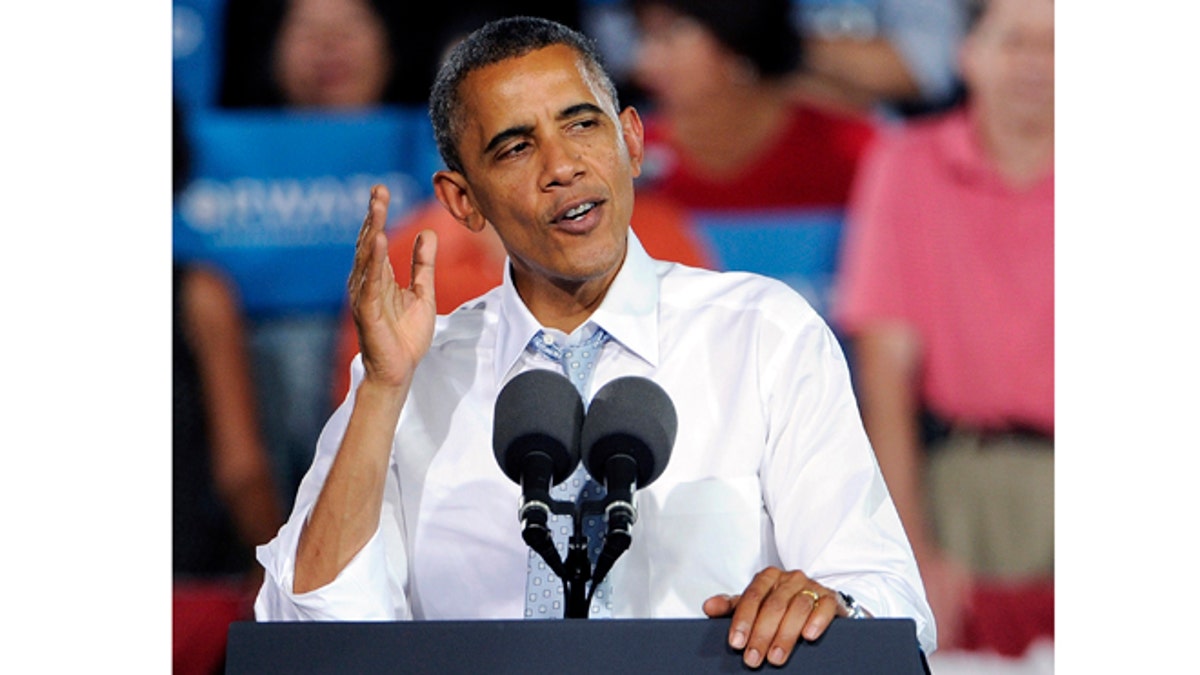
Sept. 30, 2012: President Obama speaks in Las Vegas. (AP)
If President Barack Obama is given a second term, one vitally important group of taxpayers—small employers—will face five key tax increases:
1. Income tax increase. A pillar of President Obama’s re-election campaign is a hike in the top two marginal income tax rates. By and large, small employers pay their small business taxes using individual tax rates. If individual tax rates are raised, so are small business tax rates. The top income tax rate is scheduled to rise from 35 percent in 2012 to 39.6 percent in 2013. According to IRS data, a clear majority of all small business profits face taxation at this top marginal income tax rate. For all intents and purposes, the top income tax rate IS the small business tax rate in America today.
President Obama and congressional Democrats claim they are raising taxes on “millionaires and billionaires” but are actually targeting successful small companies. A new study by Ernst and Young projects that this tax rate hike will kill 710,000 small business jobs.
2. Death Tax Increase. The death tax in 2012 has a top rate of 35 percent, and a “standard deduction” of $5 million ($10 million in the case of a married couple or surviving spouse). President Obama’s plan proposes raising the rate to 45 percent and slashing the exemption to $3.5 million.
When a family business owner dies, it’s up to the surviving family members to pay the death tax to the government. Needless to say, many successful, job-creating small businesses simply won’t survive this process. Such families will have little choice but to sell the business (and lay off all the employees) in order to pay the IRS. Or they will have to pay a small fortune to lawyers, accountants, and the life insurance industry to avoid this fate.
3. ObamaCare self-employment tax rate increase. Currently, successful small business owners face a self-employment tax of 2.9 percent. Thanks to ObamaCare’s 2013 hike in this tax rate, this will rise to 3.8 percent. All told, the combination of the income tax hike and the self-employment tax hike will raise the marginal income tax rate on small business profits from about 38 percent today to about 43 percent in 2013. That extra five percentage points might not sound like a lot, but most small employers have very thin profit margins. A company with $1 million in profits facing a higher tax rate of 5 percentage points will be saddled with another $50,000 in taxes.
4. ObamaCare Medical Device Tax: Taking effect in 2013, this 2.3 percent tax on companies making devices such as prosthetic limbs, pacemakers, and operating tables is particularly destructive because it is levied on gross sales, even if the respective company doesn’t earn a profit in a given year. The industry employs 409,000 Americans in 12,000 plants across the country, and many incur a loss for several years as they pioneer the next generation of life-improving devices.
This looming $20 billion tax is already causing small business job loss and cuts to research and development budgets. Even liberal Democratic Massachusetts Senate candidate Elizabeth Warren knows the medical device tax is destructive to small business. She wrote an op-ed in opposition to the tax, saying: “When Congress taxes the sale of a specific product through an excise tax, as the Affordable Care Act does with medical devices, it too often disproportionately impacts the small companies with the narrowest financial margins and the broadest innovative potential. It also pushes companies of all sizes to cut back on research and development for life-saving product.”
Eighty percent of device companies have fewer than 50 employees, according to the Medical Device Manufacturers Association. Many of these small businesses are located in electoral swing states such as Ohio, Wisconsin, Florida, and New Hampshire.
5. ObamaCare Investment Surtax: Also taking effect in 2013, this tax increase captures those few small business owners not covered by the self-employment tax hike: owners of Subchapter-S corporations and limited partners. These owners are currently exempt from self-employment tax, mostly because they are investors rather than proprietors. But ObamaCare sweeps them into the IRS net too, forcing them to pay the 3.8 percentage point tax as an “investor surtax.” This will make it far more difficult for investors to raise money to start up small firms. An investor is going to need to see even greater small business profit projections to overcome this higher “hurdle rate” of taxes. Not only does a small business owner have to give his investor a strong return on his investment, he now has to do it with a giant tax mill around his neck.
These five tax increases only begin to scratch the surface. Small employers are also facing the ObamaCare employer mandate tax penalty starting in 2014. This tax provision will force small businesses with more than 50 employees to purchase “qualifying” health insurance, or else face a tax of up to $2,000 per employee.
In taxes, a truism is that if you want less of something, you tax it more. Whether he realizes it or not, President Obama’s tax policies will result in fewer and less successful small businesses, fewer small business jobs, fewer family businesses that can be passed along from parents to children, fewer medical device manufacturing jobs, and much less investment in small employer start-ups.
Ryan Ellis is tax policy director at Americans for Tax Reform and John Kartch is the organization’s director of communications. Follow them on Twitter at @RyanLEllis and @JohnKartch.
